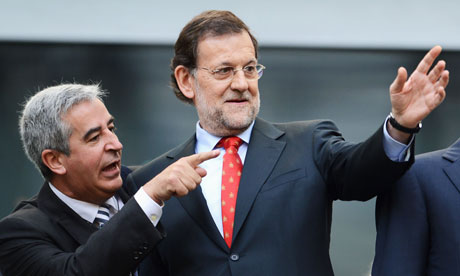Shares in London and major European markets move sharply higher and the euro climbs to a three-week high

Spanish prime minister Mariano Rajoy (R) at the Euro 2012 football match between Spain and Italy. Photograph: Jasper Juinen/Getty Images
Global stock markets surged in relief on Monday after weekend news of Spain's €100bn (£81bn) banking bailout, although market experts warned that the respite from the crisis would only be temporary.
Shares in London and major European markets moved sharply higher when trading opened and the euro climbed to a three-week high, at $1.2630. Spain's Ibex index raced ahead by more than 5% and the yield, or interest rate, on its government bonds also fell sharply, reducing the country's cost of borrowing. Ten-year bond yields dropped to 6.049% from 6.227% earlier this morning. Italian bonds also benefited from the Spanish banking bailout, falling to 5.648% from 5.966% at 7am.
"It all comes down to size and whether this is enough to stem the tide of fear, but does not stoke it further," said Simon Smith, chief economist at foreign exchange broker FxPro.
The FTSE 100 index in London jumped nearly 100 points in the first minute of trading, gaining 1.8% to 5534. Italy's FTSE MiB and Germany's Dax both rose 2.1% and France's CAC rose 2%.
In Asia, markets also rallied, with Japan's Nikkei climbing nearly 2% to 8624.90. Hong Kong's Hang Seng added 2.4% to 18,937.53 while the Straits Times index in Singapore rose 1.5% to 2779.97.
Brent crude futures rose more than $2 to $102.21 a barrel, while US crude touched $86.64 a barrel.
Michael Hewson, senior market analyst at CMC Markets UK, said the market rally "is likely to be no more than a relief pop".
There do remain "a number of unanswered questions," he said, such as the problem of where this €100bn is going to come from - the soon to be retired EFSF or the new European Stability Mechanism (ESM) which is due to come into effect in July.
"This will be important given that if the money comes from the (ESM) any creditors will have preferred status which will subordinate existing bond holders and thus have the unintended effect of making Spain's funding difficulties much worse, as investors will be reluctant to expose themselves to the added risk of finding themselves at the back of the queue, in the event of a potential future restructuring if Spain's problems get worse with a deteriorating economic outlook."
Richard Hunter, head of equities at Hargreaves Lansdown stockbrokers, said: "The Spanish announcement is not a solution to the eurozone's ongoing woes, but it is a statement of intent.
"Despite the fact that details have to date been sketchy on the ultimate resolution of the European crisis, one constant has been a declaration by the authorities that the area will remain intact.
"Some much-needed time has now been bought in Spain, which will allow the market at least temporary sigh of relief."
Spain's prime minister, Mariano Rajoy, attempted to portray the cash lifeline for Spain's troubled banking sector as a triumph at the weekend.
Speaking hours before flying to Poland to watch Spain's World Cup-winning soccer team play its first match of Euro 2012, Rajoy proclaimed that the "credibility of the euro won" following Saturday's bank bailout, funded by eurozone countries.
But with Greeks returning to the polls on Sunday, the crisis engulfing the eurozone is far from over amid speculation that the absence of tough conditions attached to the loans being readied for Spain could give ammunition to attempts by Greece, Ireland or Portugal to renegotiate the terms of their bailouts.
This article can be found at:
No comments:
Post a Comment